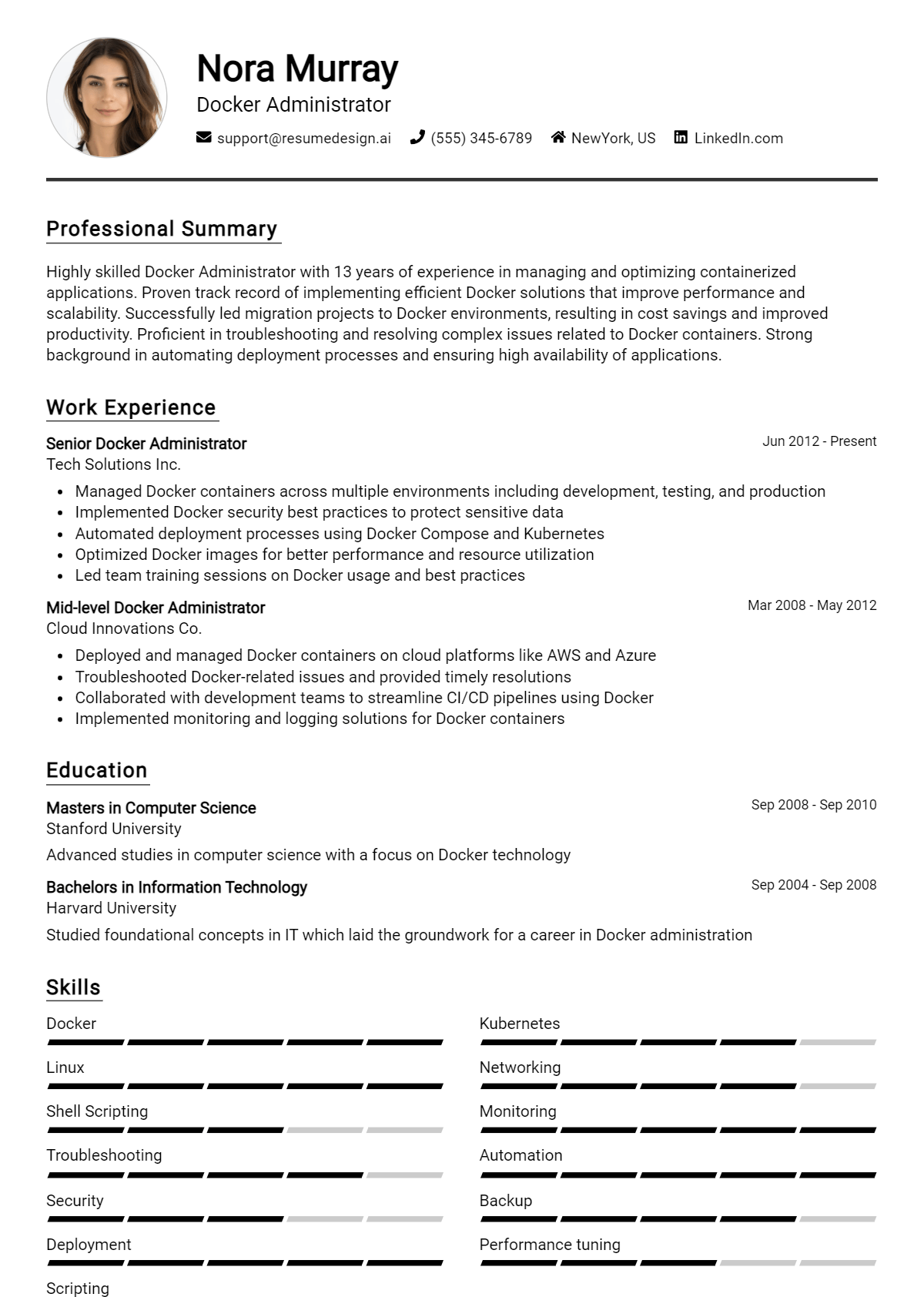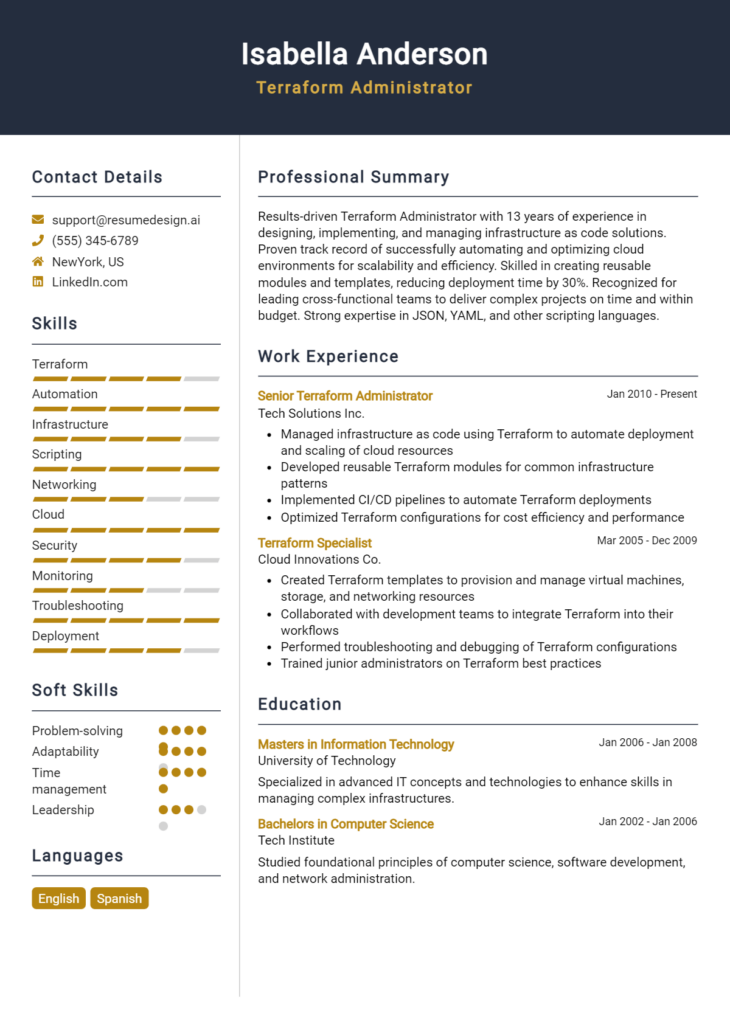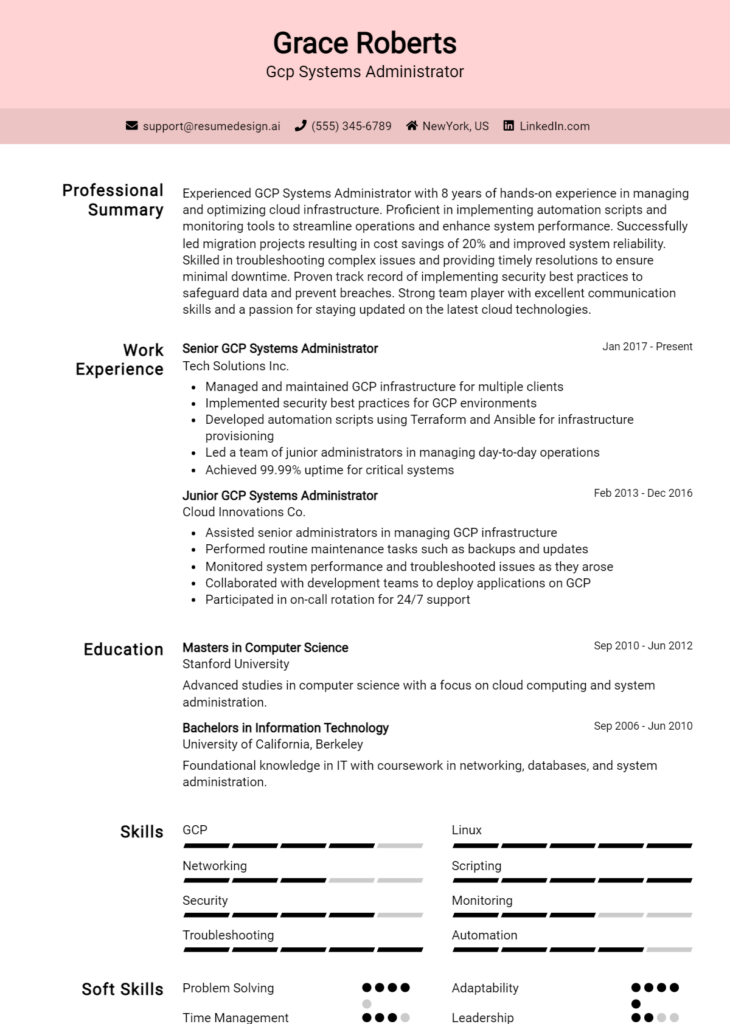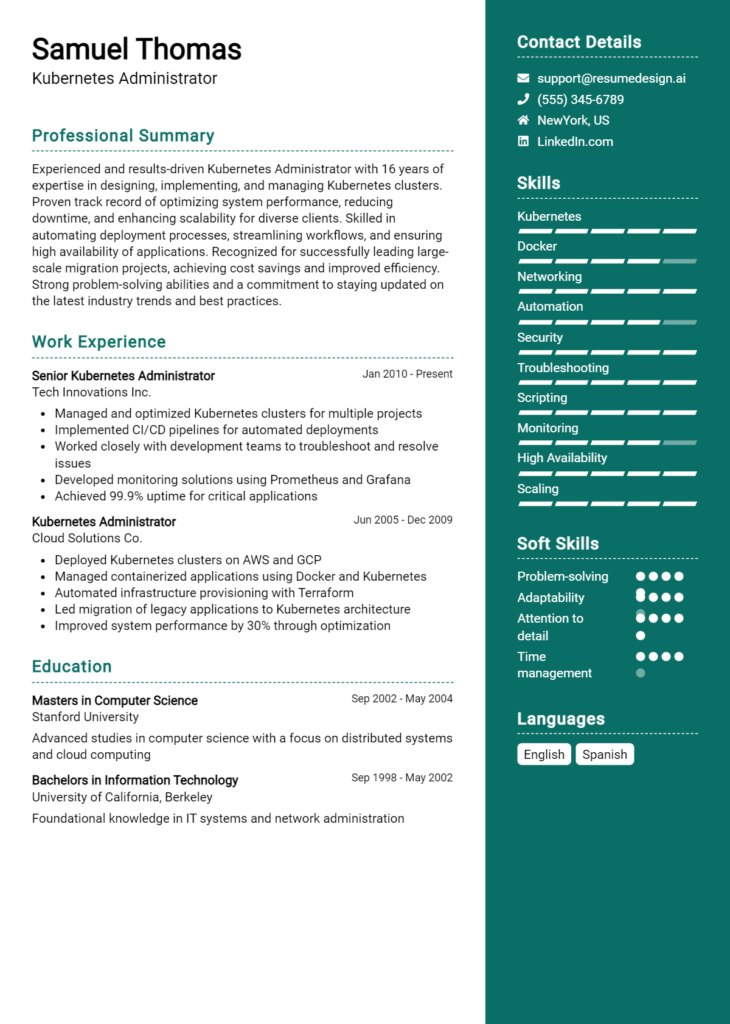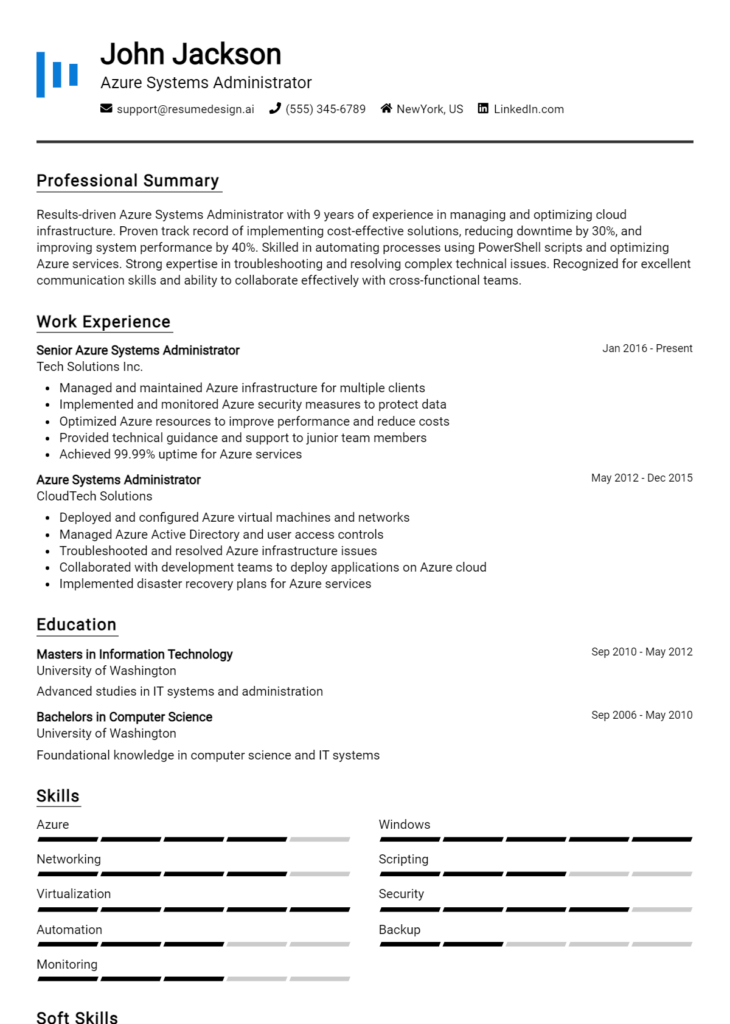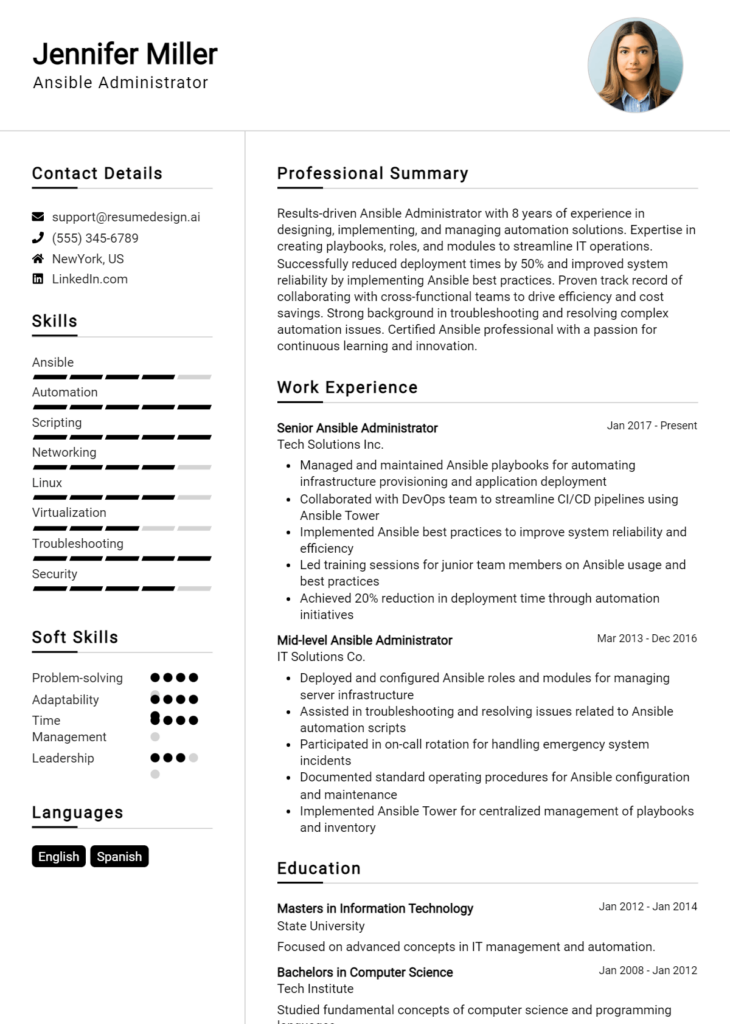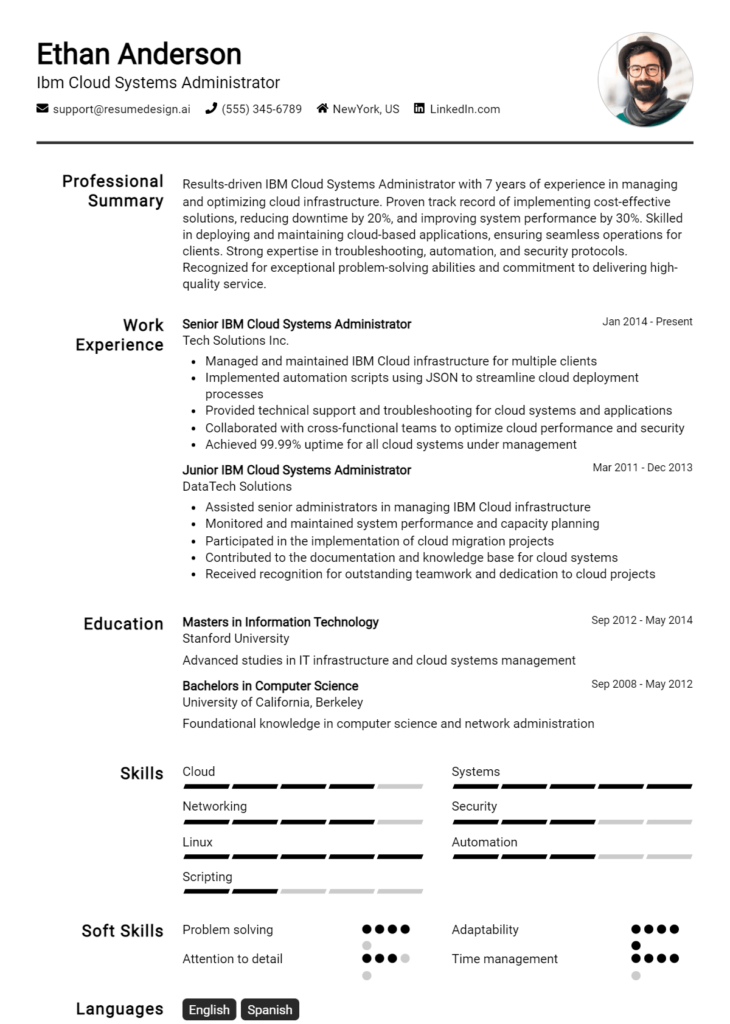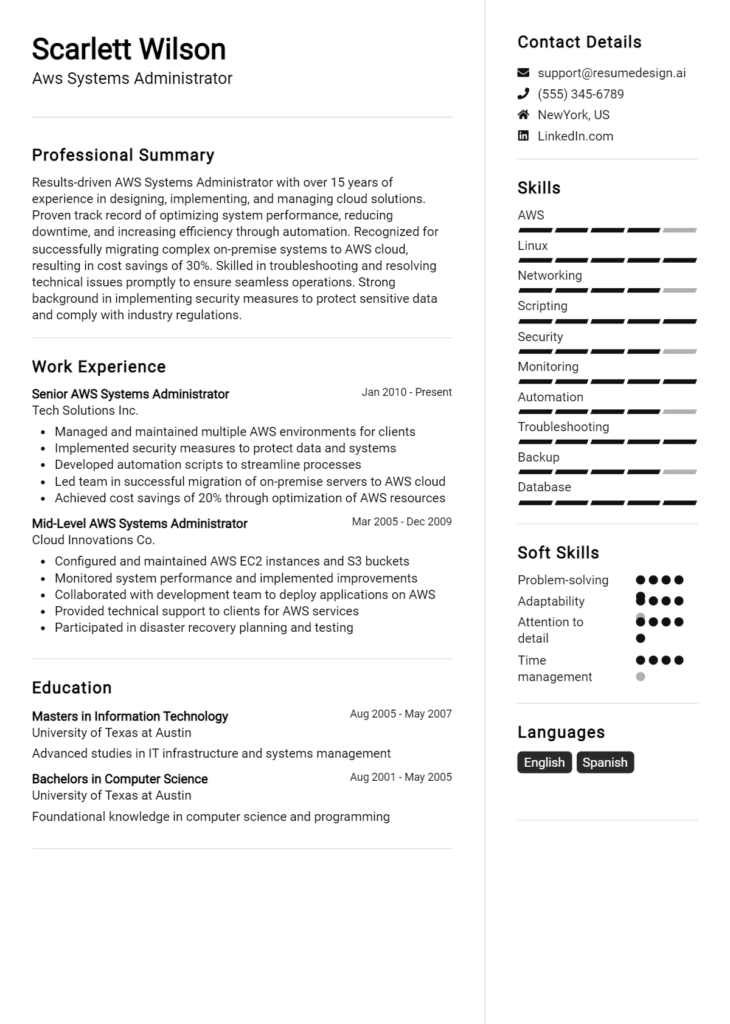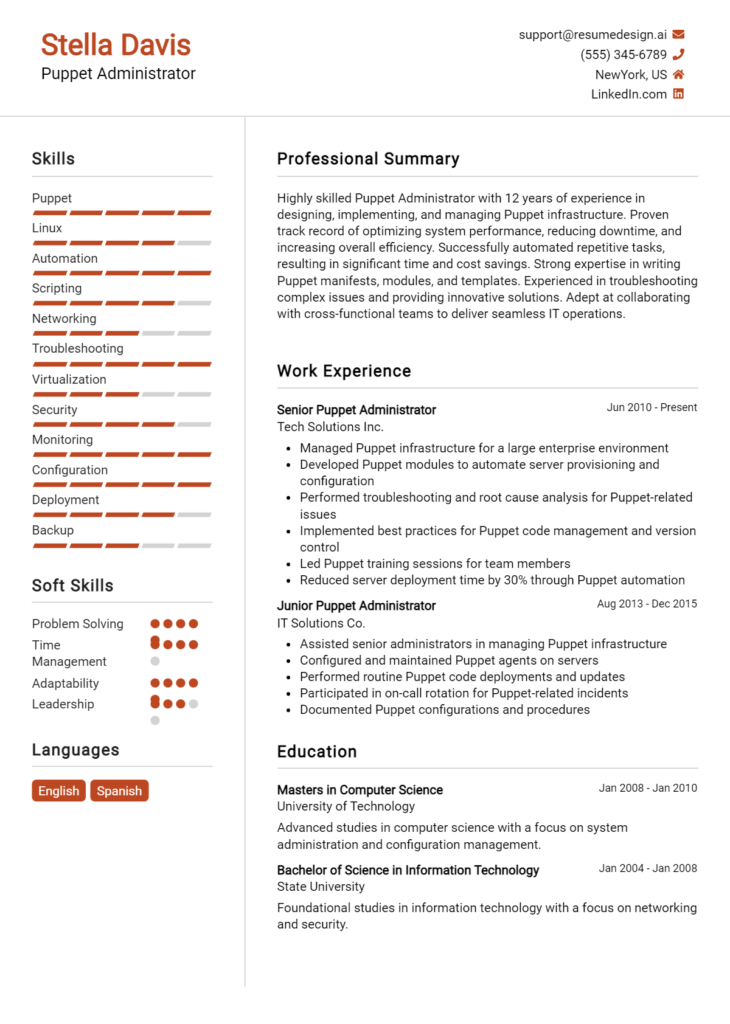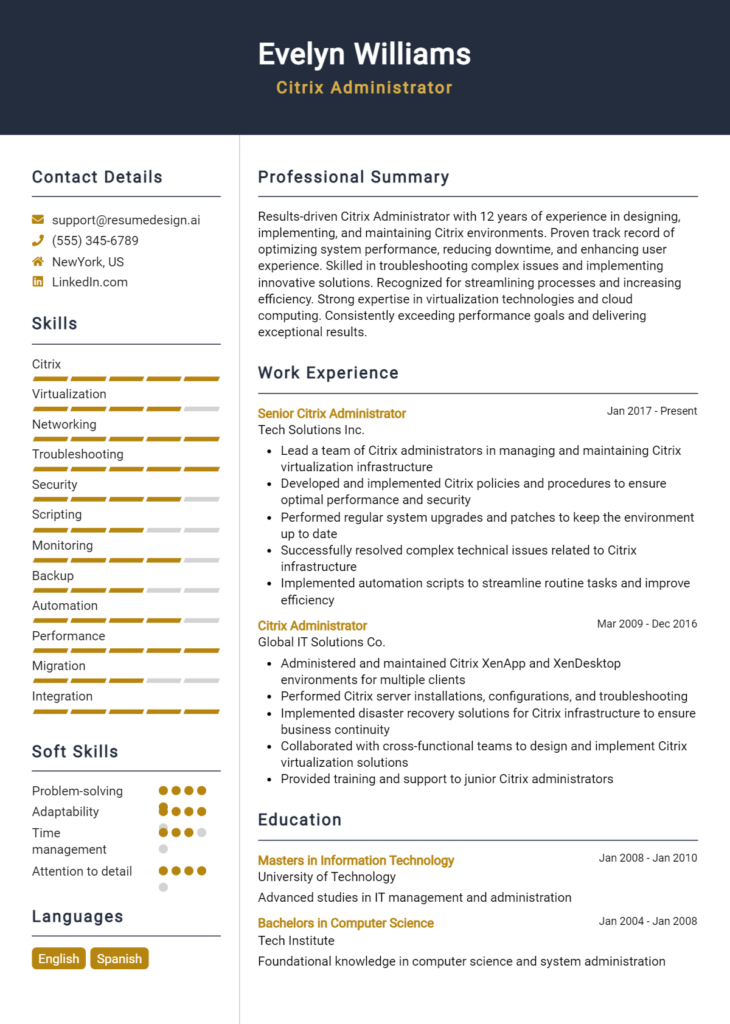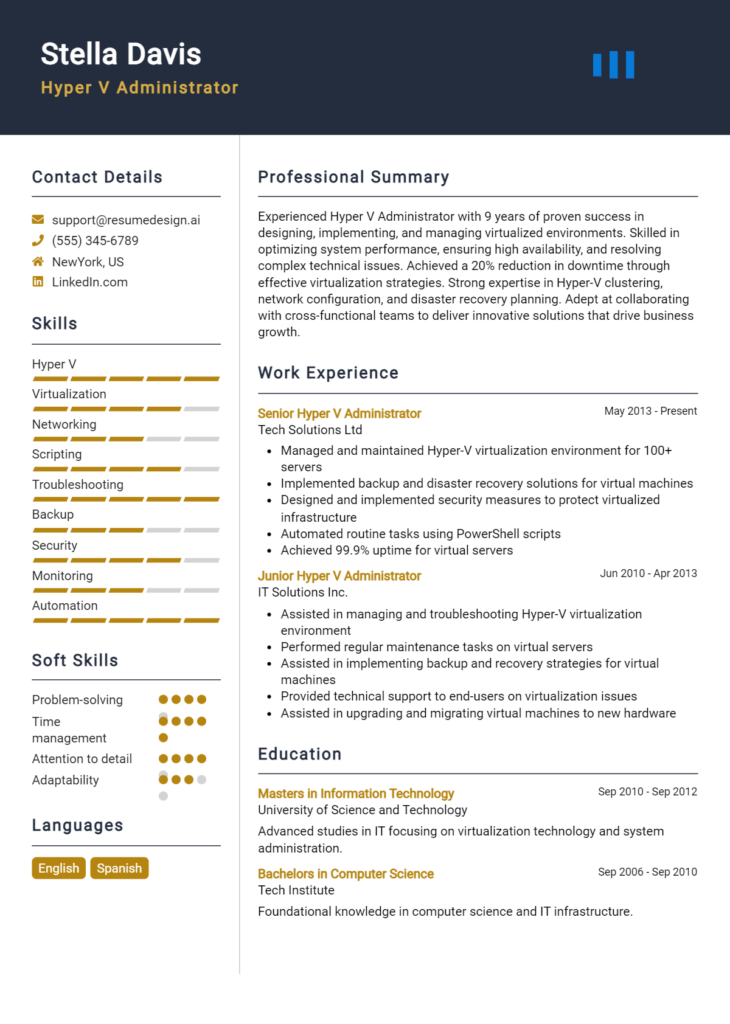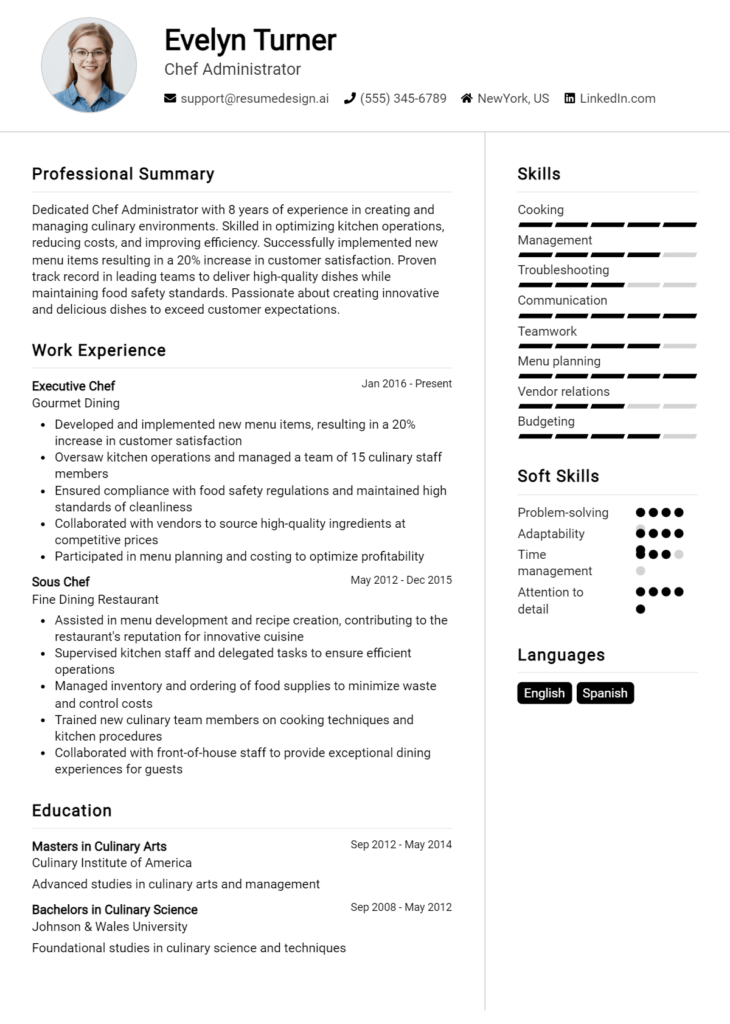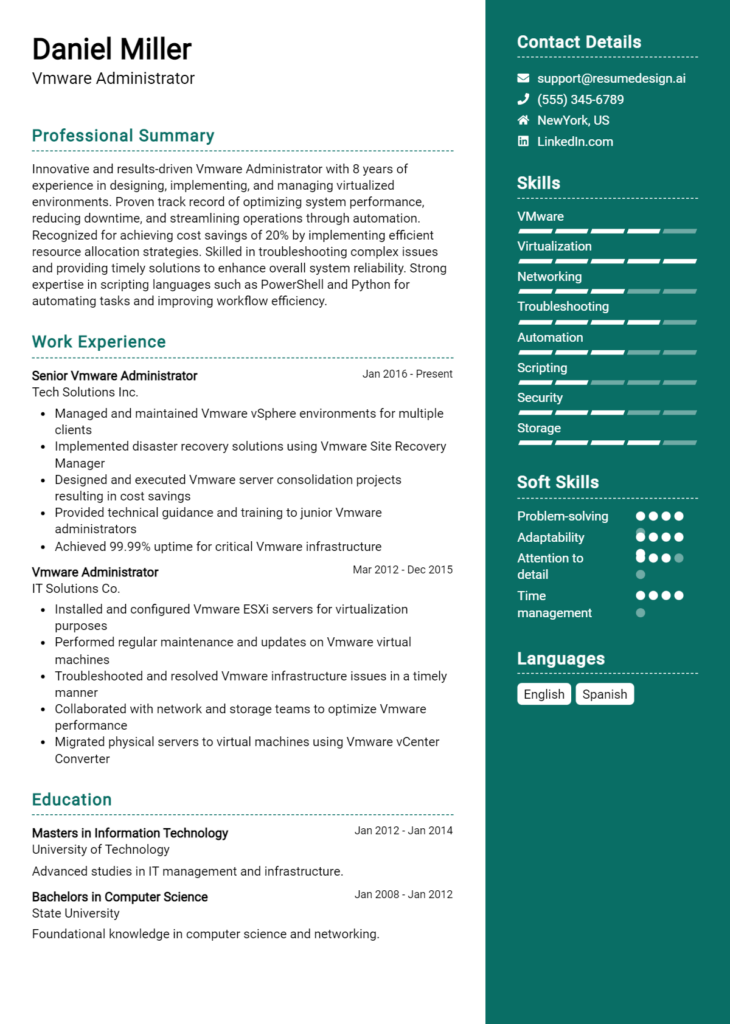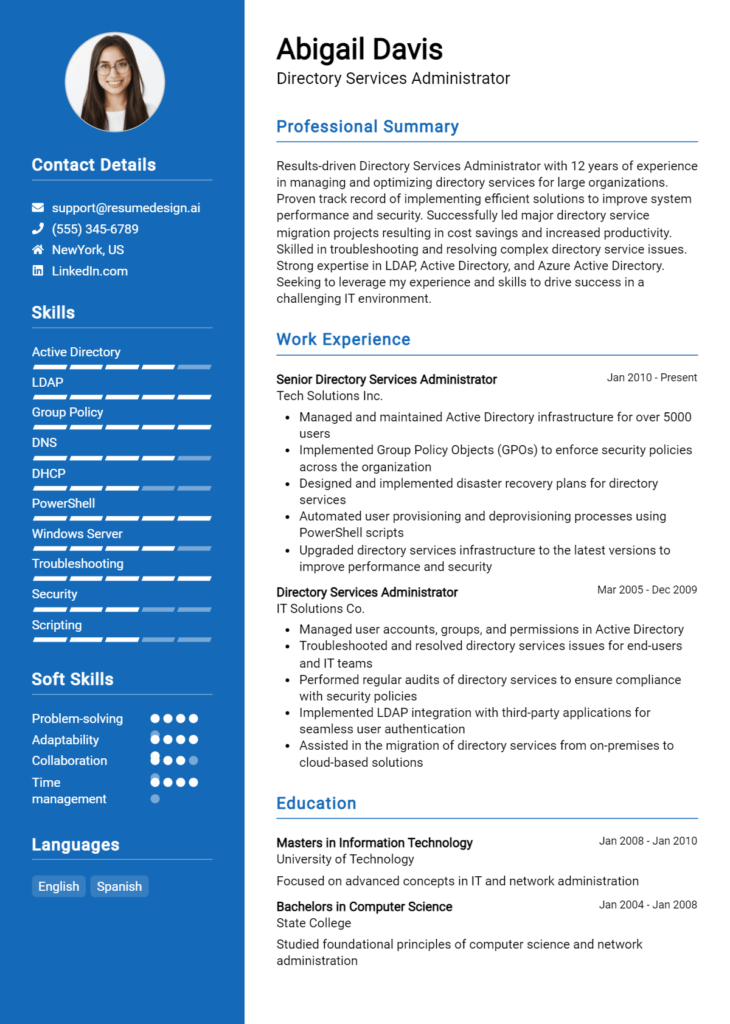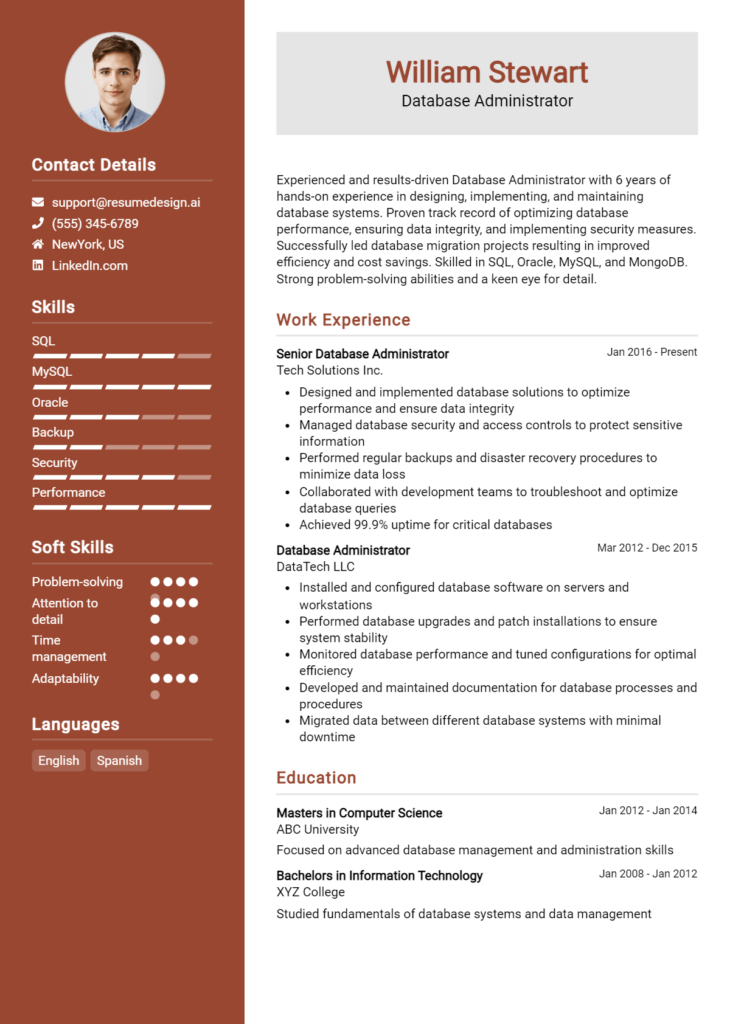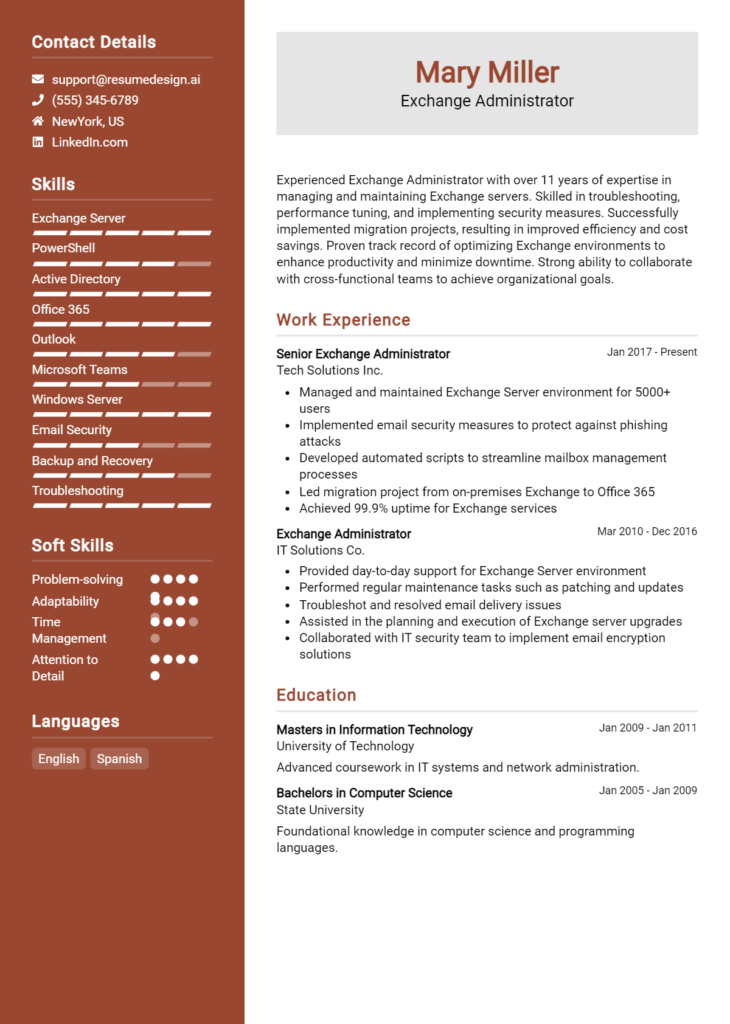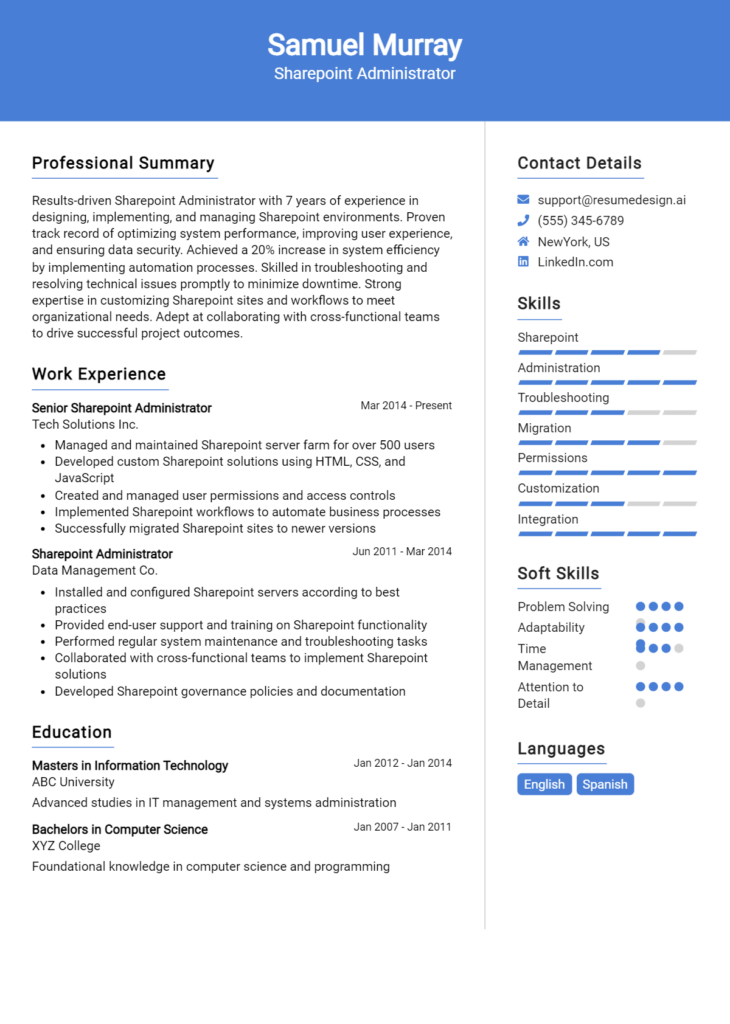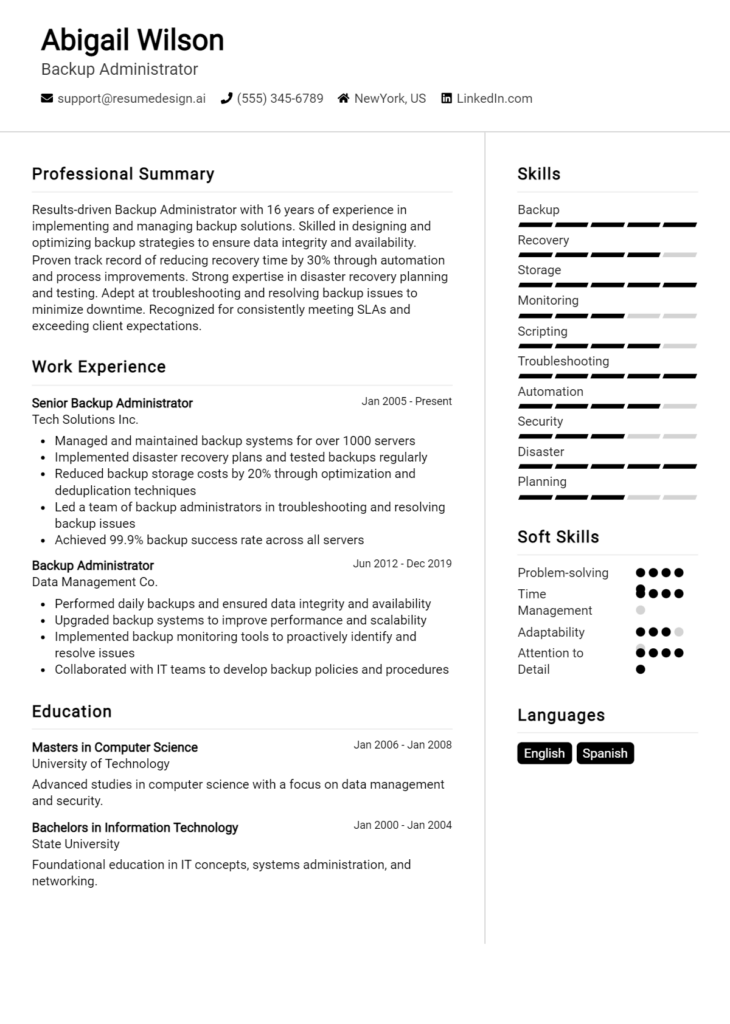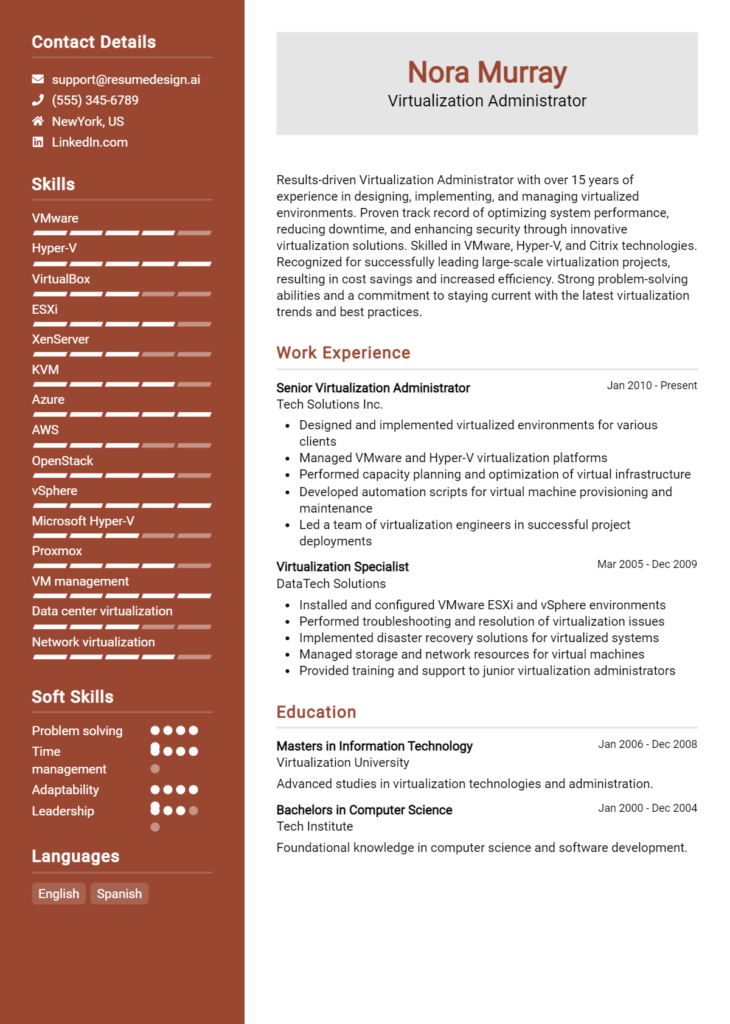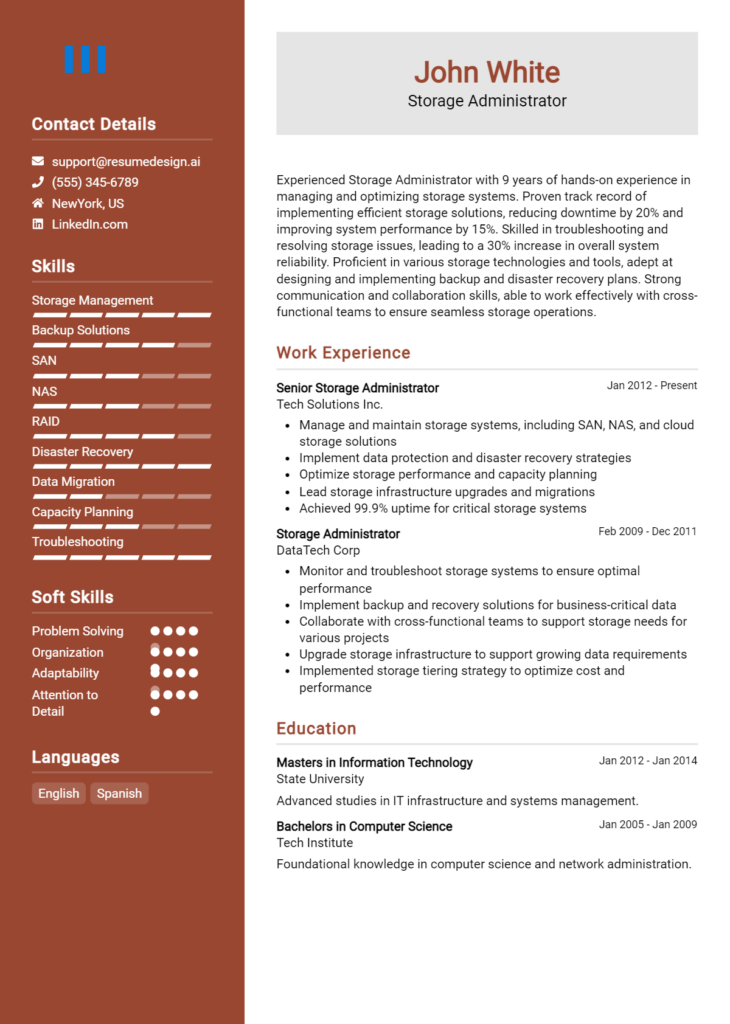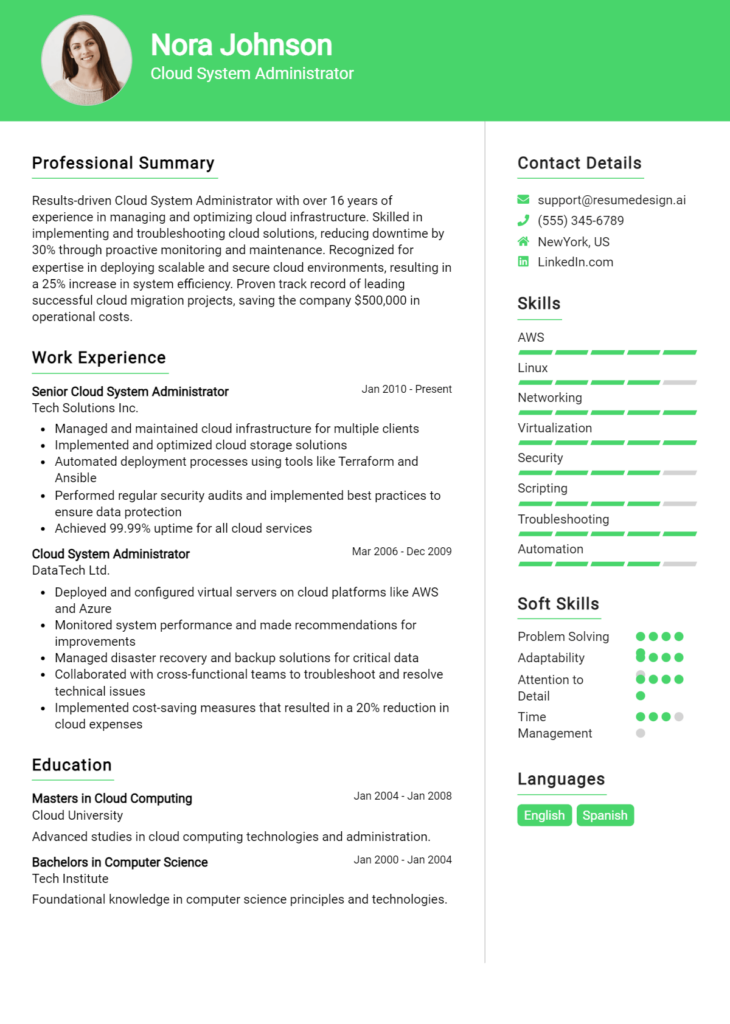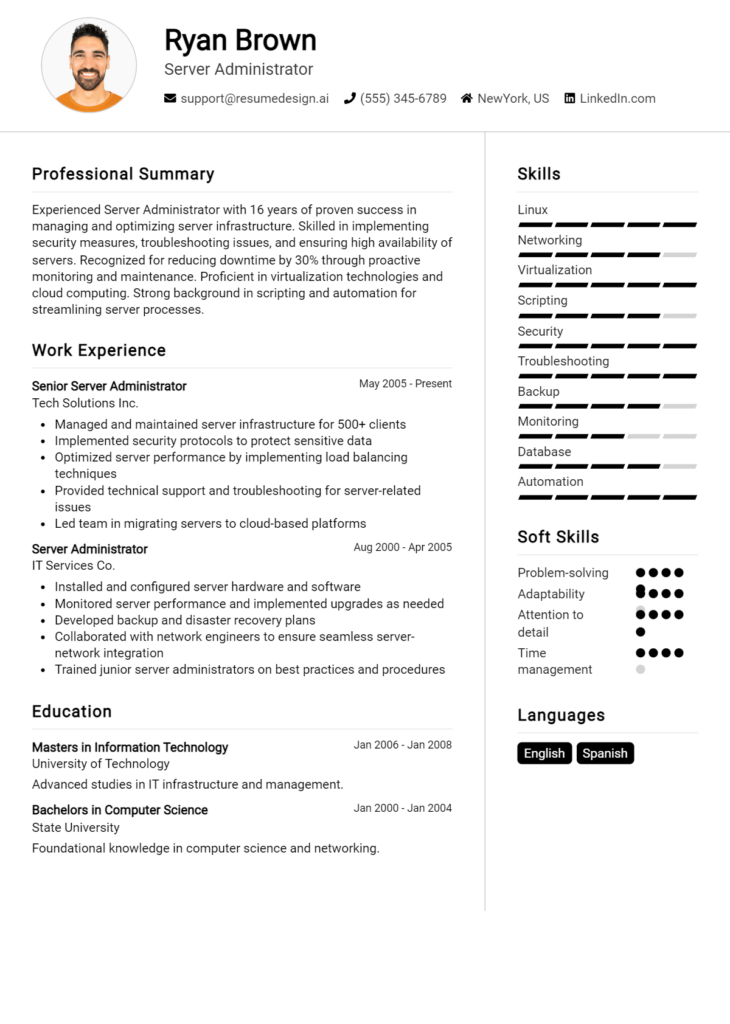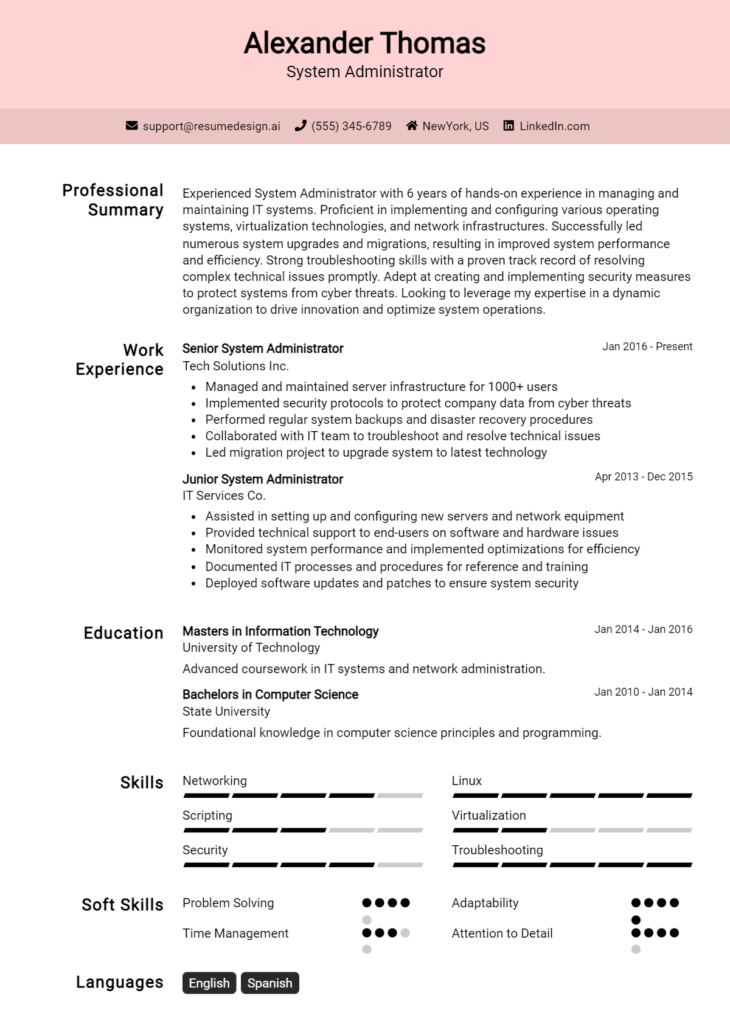Docker Administrator Core Responsibilities
A Docker Administrator plays a crucial role in managing containerized applications, ensuring seamless deployment, scalability, and efficiency across various departments. Key responsibilities include configuring Docker environments, orchestrating container management, and troubleshooting issues. This position requires strong technical skills in containerization, operational expertise, and effective problem-solving abilities. By collaborating with development, operations, and IT teams, a Docker Administrator contributes to the organization's goals. A well-structured resume that highlights these qualifications can significantly enhance job prospects.
Common Responsibilities Listed on Docker Administrator Resume
- Design and implement containerized applications using Docker.
- Manage Docker clusters and orchestration tools like Kubernetes.
- Monitor and optimize container performance and resource utilization.
- Ensure security best practices for containerized environments.
- Automate deployment processes and CI/CD pipelines.
- Collaborate with development and operations teams for seamless integration.
- Troubleshoot and resolve container-related issues promptly.
- Document system configurations and standard operating procedures.
- Conduct training sessions for team members on Docker usage.
- Evaluate and implement new container technologies and tools.
- Assist in disaster recovery planning and execution.
- Maintain up-to-date knowledge of industry trends and best practices.
High-Level Resume Tips for Docker Administrator Professionals
In today's competitive job market, a well-crafted resume is essential for Docker Administrator professionals seeking to make a strong first impression on potential employers. Your resume serves as the initial introduction to your skills, experiences, and accomplishments, making it crucial that it effectively communicates your expertise in containerization and orchestration technologies. It should not only outline your technical abilities but also highlight your achievements in managing Docker environments and contributing to successful projects. This guide will provide practical and actionable resume tips specifically tailored for Docker Administrator professionals, helping you showcase your qualifications in the best light possible.
Top Resume Tips for Docker Administrator Professionals
- Tailor your resume to match the job description by incorporating relevant keywords and phrases that align with the position's requirements.
- Highlight your experience with Docker and related technologies, ensuring to list specific projects and roles that demonstrate your expertise.
- Quantify your achievements by using metrics such as reduced deployment times, improved system performance, or increased efficiency in container management.
- Showcase your familiarity with CI/CD tools and practices, as these are often integral to a Docker Administrator's role.
- Include any relevant certifications, such as Docker Certified Associate or other cloud-related credentials, to validate your skills.
- Emphasize your problem-solving abilities by detailing instances where you resolved critical issues in containerized environments.
- List programming and scripting languages you are proficient in, particularly those relevant to Docker, such as Python, Bash, or Go.
- Highlight your experience with orchestration tools like Kubernetes, as they are often used in conjunction with Docker.
- Keep your resume concise and focused, ideally within one to two pages, ensuring that every line adds value to your candidacy.
- Utilize a clean and professional format that enhances readability, making it easy for hiring managers to quickly assess your qualifications.
By implementing these tips, you can significantly increase your chances of landing a job in the Docker Administrator field. A well-structured resume that clearly outlines your skills, experiences, and achievements will not only attract the attention of hiring managers but also demonstrate your commitment and capability in this vital area of IT infrastructure management.
Why Resume Headlines & Titles are Important for Docker Administrator
In the competitive job market for Docker Administrators, the importance of resume headlines and titles cannot be overstated. A well-crafted headline serves as the first impression for hiring managers, encapsulating a candidate's key qualifications in a single, impactful phrase. A strong headline can immediately grab attention, making the candidate stand out among a sea of applicants. It should be concise, relevant, and directly related to the job being applied for, ensuring that it reflects the candidate's expertise and suitability for the role.
Best Practices for Crafting Resume Headlines for Docker Administrator
- Keep it concise—aim for one to two lines.
- Use industry-specific terminology to demonstrate expertise.
- Highlight key skills relevant to Docker administration.
- Incorporate quantifiable achievements whenever possible.
- Tailor the headline to the specific job description.
- Avoid jargon that may not be understood by all hiring managers.
- Ensure it aligns with your overall resume content.
- Make it compelling to entice the reader to learn more.
Example Resume Headlines for Docker Administrator
Strong Resume Headlines
"Certified Docker Administrator with 5+ Years of Experience in Container Orchestration"
“Dynamic Docker Specialist Focused on Streamlining CI/CD Pipelines”
“Results-Driven Docker Administrator with Proven Track Record in Cloud Deployments”
Weak Resume Headlines
“Seeking a Job in IT”
“Docker User”
Strong headlines are effective because they immediately convey the candidate's expertise and experience in a way that resonates with hiring managers. They highlight specific skills, accomplishments, and qualifications that are directly relevant to the Docker Administrator role. In contrast, weak headlines fail to impress because they lack specificity and do not communicate any meaningful information about the candidate's abilities or professional background, making it difficult for hiring managers to see their potential fit for the position.
Writing an Exceptional Docker Administrator Resume Summary
A well-crafted resume summary is essential for a Docker Administrator, as it serves as the first impression for hiring managers reviewing a candidate's application. This brief section quickly captures attention by highlighting key skills, relevant experience, and notable accomplishments that align with the job requirements. A strong summary should be concise yet impactful, offering a snapshot of the candidate's qualifications tailored specifically to the role they are applying for. This tailored approach not only reflects the candidate's understanding of the position but also demonstrates their ability to communicate effectively.
Best Practices for Writing a Docker Administrator Resume Summary
- Quantify Achievements: Use specific numbers or metrics to showcase your accomplishments, such as the number of containers managed or performance improvements achieved.
- Focus on Skills: Highlight relevant technical skills, such as proficiency in Docker, Kubernetes, or CI/CD pipelines, that are essential for the role.
- Tailor the Summary: Customize your summary for each job application, reflecting the specific requirements and keywords mentioned in the job description.
- Be Concise: Keep your summary brief, ideally between 2 to 4 sentences, to ensure it remains impactful and easy to read.
- Use Action Words: Start sentences with strong action verbs to convey a sense of proactivity and capability.
- Showcase Relevant Experience: Include specific experiences that directly relate to Docker administration, demonstrating your expertise in the field.
- Convey Enthusiasm: Infuse a sense of passion for the technology and the role to create a positive impression on potential employers.
- Highlight Certifications: If applicable, mention any relevant certifications that can strengthen your credentials as a Docker Administrator.
Example Docker Administrator Resume Summaries
Strong Resume Summaries
Results-driven Docker Administrator with over 5 years of experience managing large-scale containerized applications. Successfully improved deployment efficiency by 30%, utilizing Docker and Kubernetes to streamline CI/CD processes.
Dedicated Docker Administrator with a proven track record of optimizing container orchestration, reducing system downtime by 25% through effective monitoring and management of Docker environments.
Skilled in deploying and maintaining Docker containers across multi-cloud environments, achieving a 40% reduction in application load times. Certified Docker Professional with a focus on automation and security best practices.
Weak Resume Summaries
Experienced IT professional interested in Docker administration and container technology.
Docker Administrator with knowledge of various technologies looking for a new opportunity in a fast-paced environment.
The examples provided illustrate the distinction between strong and weak resume summaries. Strong summaries are marked by specific achievements, quantifiable results, and relevant skills that directly relate to the Docker Administrator role, making them impactful and tailored. In contrast, weak summaries lack specificity and fail to demonstrate the candidate's qualifications or unique contributions, making them forgettable and less appealing to hiring managers.
Work Experience Section for Docker Administrator Resume
The work experience section is a crucial component of a Docker Administrator resume, as it presents the candidate's technical skills and practical application of those skills in real-world scenarios. This section allows potential employers to gauge not only the candidate's proficiency with Docker and containerization but also their ability to manage teams, streamline processes, and deliver high-quality products. By quantifying achievements and aligning experiences with industry standards, candidates can effectively demonstrate their value and relevance in today's competitive job market.
Best Practices for Docker Administrator Work Experience
- Focus on specific Docker technologies and tools used in past roles.
- Quantify achievements with metrics (e.g., reduced deployment times by 30%).
- Highlight leadership roles and team management experiences.
- Detail collaborative projects that demonstrate teamwork and communication.
- Include relevant industry certifications and ongoing education.
- Tailor experiences to match the job description and required skills.
- Use action verbs to convey impact (e.g., orchestrated, implemented, optimized).
- Showcase problem-solving abilities with real-world examples.
Example Work Experiences for Docker Administrator
Strong Experiences
- Implemented a Docker-based CI/CD pipeline that reduced application deployment time by 40%, resulting in faster time-to-market for new features.
- Led a team of 5 in migrating legacy applications to a microservices architecture using Docker, improving system scalability and reliability by 50%.
- Collaborated with development and operations teams to streamline container orchestration processes, which improved resource utilization by 35%.
- Designed and executed a comprehensive training program for staff on Docker best practices, increasing team efficiency and knowledge retention by over 60%.
Weak Experiences
- Worked with Docker on various projects.
- Assisted in maintaining containerized applications.
- Helped with deployment tasks.
- Participated in team meetings related to Docker.
The examples labeled as strong demonstrate clear, quantifiable outcomes and impactful contributions to projects, showcasing both technical expertise and leadership. In contrast, the weak examples lack specificity and measurable results, making them less impressive and failing to highlight the candidate's true capabilities and achievements in the field of Docker administration.
Education and Certifications Section for Docker Administrator Resume
The education and certifications section of a Docker Administrator resume plays a crucial role in showcasing the candidate's academic background and professional qualifications. It serves as a vital indicator of the individual's commitment to the field, demonstrating not only their foundational knowledge but also their dedication to continuous learning through industry-relevant certifications and specialized training. This section allows candidates to highlight relevant coursework and credentials that align with the specific demands of a Docker Administrator role, ultimately enhancing their credibility and making them more attractive to potential employers.
Best Practices for Docker Administrator Education and Certifications
- Focus on relevant degrees in Computer Science, Information Technology, or related fields.
- Include current and recognized industry certifications such as Docker Certified Associate (DCA) or Certified Kubernetes Administrator (CKA).
- Detail any specialized training programs that directly relate to containerization and cloud technologies.
- Highlight relevant coursework that includes topics like DevOps practices, cloud computing, and container orchestration.
- Keep the information concise and focused; avoid unrelated educational experiences.
- Update the section regularly to reflect new certifications and learning achievements.
- Use clear formatting to distinguish between degrees, certifications, and training for better readability.
- Consider including online courses or bootcamps that have a strong reputation in the industry.
Example Education and Certifications for Docker Administrator
Strong Examples
- Bachelor of Science in Computer Science, XYZ University, Graduated 2021
- Docker Certified Associate (DCA), Issued March 2023
- Completed Coursera Specialization in Cloud Computing with a focus on Docker and Kubernetes, 2022
- Certified Kubernetes Administrator (CKA), Issued January 2023
Weak Examples
- Associate Degree in Art, ABC Community College, Graduated 2019
- Old certification in Microsoft Windows Server 2008, Expired 2021
- Certificate in Digital Marketing, Issued 2020
- High School Diploma, Graduated 2015
The examples provided are considered strong because they directly relate to the skills and knowledge required for a Docker Administrator, showcasing relevant degrees and up-to-date certifications that reflect an active engagement with current technology trends. In contrast, the weak examples highlight qualifications that are either outdated, irrelevant to the position, or do not demonstrate a connection to the field of containerization and cloud technology, thus failing to bolster the candidate's profile in this competitive job market.
Top Skills & Keywords for Docker Administrator Resume
As a Docker Administrator, possessing a well-defined set of skills is crucial for crafting an effective resume that stands out to potential employers. The right combination of hard and soft skills not only showcases your technical expertise but also highlights your ability to collaborate and communicate within a team. In the rapidly evolving landscape of containerization and cloud computing, demonstrating proficiency in Docker and related technologies can make the difference between landing an interview or being overlooked. A well-rounded skill set reflects your readiness to tackle challenges and contribute to the organization's success, making it essential to emphasize these skills on your resume.
Top Hard & Soft Skills for Docker Administrator
Soft Skills
- Effective communication
- Team collaboration
- Problem-solving
- Adaptability
- Time management
- Attention to detail
- Critical thinking
- Conflict resolution
- Customer service orientation
- Analytical mindset
Hard Skills
- Proficiency in Docker and container orchestration
- Experience with Kubernetes
- Knowledge of CI/CD pipelines
- Familiarity with cloud platforms (AWS, Azure, GCP)
- Understanding of networking concepts
- Scripting and automation (Bash, Python)
- Experience with configuration management tools (Ansible, Puppet)
- Knowledge of monitoring and logging tools (Prometheus, ELK Stack)
- Understanding of security best practices for containers
- Familiarity with version control systems (Git)
By integrating both soft and hard skills into your resume, along with relevant work experience, you will be well-positioned to demonstrate your qualifications as a proficient Docker Administrator.
Stand Out with a Winning Docker Administrator Cover Letter
As a dedicated and skilled Docker Administrator with over five years of experience in containerization, I am excited to apply for the position at [Company Name]. My expertise in managing and orchestrating Docker containers, coupled with a strong foundation in DevOps practices, has equipped me with the tools necessary to streamline application deployment and foster a culture of continuous integration and delivery. I am particularly drawn to [Company Name] due to its innovative approach to technology and commitment to improving operational efficiency, which aligns perfectly with my professional values.
In my previous role at [Previous Company Name], I successfully implemented Docker-based solutions, resulting in a 40% reduction in deployment times and improved scalability of our applications. I have extensive experience with Docker Compose and Docker Swarm, enabling me to manage complex multi-container applications effectively. My proficiency in integrating Docker with CI/CD pipelines has allowed teams to achieve faster feedback loops, ultimately enhancing the overall software development lifecycle. Additionally, my strong troubleshooting skills and attention to detail ensure that any issues are resolved swiftly, minimizing downtime and maintaining productivity.
I am passionate about leveraging containerization technologies to optimize resource utilization and improve system reliability. I thrive in collaborative environments and enjoy working closely with cross-functional teams to identify areas for improvement and implement best practices. My commitment to continuous learning and professional development has driven me to stay current with industry trends and emerging technologies, allowing me to bring innovative solutions to the table that can benefit [Company Name].
Thank you for considering my application. I am eager to discuss how my skills and experience can contribute to the ongoing success of [Company Name] as a Docker Administrator. I look forward to the opportunity to connect and explore how I can help drive your containerization initiatives forward.
Common Mistakes to Avoid in a Docker Administrator Resume
When crafting a resume for a Docker Administrator position, it's crucial to present your skills and experiences accurately and effectively. However, many candidates fall into common pitfalls that can undermine their chances of landing an interview. From vague descriptions of technical skills to neglecting to highlight relevant certifications, these missteps can weaken an otherwise strong resume. Below are some common mistakes to avoid when writing your Docker Administrator resume:
Vague Job Descriptions: Failing to provide specific details about past roles can leave hiring managers unsure of your level of expertise. Use quantifiable achievements and clear responsibilities to illustrate your contributions.
Overloading with Jargon: While technical terminology is important, overusing jargon can make your resume difficult to read. Strive for a balance between technical language and clarity to ensure your skills are understood.
Ignoring Relevant Skills: Not highlighting key Docker-related skills, such as container orchestration with Kubernetes or CI/CD integration, can make your resume less competitive. Tailor your skills section to match the job requirements.
Lack of Certifications: Many employers value certifications in Docker and container management. Failing to mention relevant certifications can be a missed opportunity to showcase your commitment to professional development.
Formatting Issues: A cluttered or unprofessional format can detract from your qualifications. Ensure your resume is well-organized, easy to read, and visually appealing to make a positive impression.
Neglecting Soft Skills: While technical skills are vital, soft skills like teamwork, communication, and problem-solving are equally important. Highlighting these attributes can demonstrate your ability to collaborate effectively in a team setting.
Not Tailoring for Each Application: Sending the same resume for multiple job applications can reduce your chances of getting noticed. Customize your resume for each position to align your experience with the specific job description.
Omitting Projects or Contributions: If you've worked on notable Docker projects or contributed to open-source initiatives, be sure to include these experiences. They can serve as excellent examples of your capabilities and passion for container technology.
Conclusion
As a Docker Administrator, you play a crucial role in managing containerization for applications, ensuring seamless deployment, and optimizing performance. Your responsibilities typically include configuring Docker environments, managing container orchestration with tools like Kubernetes, and troubleshooting issues that arise within containerized applications. A strong understanding of networking, storage management, and security practices related to Docker is essential for success in this role.
To excel in your career as a Docker Administrator, it is important to keep your resume up to date, showcasing your skills, certifications, and relevant experiences. A well-crafted resume can significantly improve your chances of landing interviews and advancing your career.
As you reflect on your professional journey, consider reviewing your Docker Administrator resume. Ensure it highlights your expertise in Docker, your problem-solving abilities, and any successful projects you have managed. A polished resume can set you apart in a competitive job market.
To assist you in this process, make use of various resources available to enhance your resume. Explore resume templates to find a format that best showcases your skills. You can also utilize a resume builder to create a professional-looking document with ease. Additionally, review resume examples for inspiration and ideas on how to present your qualifications effectively. Don’t forget to consider cover letter templates to complement your resume and further highlight your fit for the role.
Take action today by updating your resume and leveraging these tools to enhance your job application strategy as a Docker Administrator. Your next career opportunity could be just around the corner!

